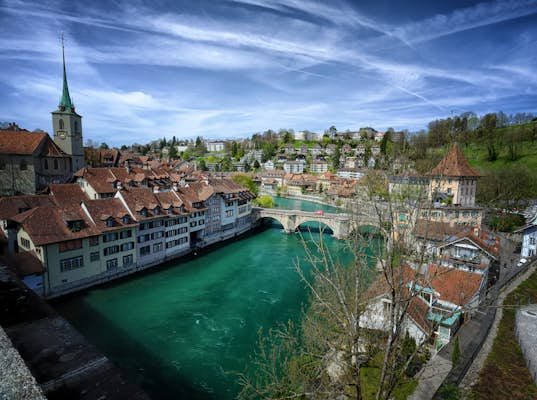Switzerland‘s famous red-and-white square flag flies from civic buildings, adorns fridge magnets and coffee mugs and is planted in window boxes in neat rows. There is, however, another colour that symbolises the country’s breathtaking Alpine scenery, and that is the bright blue of the Aare River.
This waterway flows from the great glaciers of the Bernese Oberland, expanding to form first Lake Brienz and then flows through Interlaken to Lake Thun. Upon passing Thun, complete with its ancient covered bridge, the Aare puts its foot down for Bern. And here, in the capital of Switzerland, Tom Hall embarked on a wild swimming adventure.

Finding our way into the river
On a previous visit to Switzerland I had seen people bobbing around in the Aare, both in Bern and on what appeared to be points many miles from a town, glimpsed from a passing train. On this visit I was determined to join them. My family and I, without realising, had traced the waters of the river from the high Alps to Bern, and then found ourselves with a sunny Sunday afternoon to spend in the Swiss capital.
We had chosen a good base, staying in the youth hostel a short stroll or funicular downhill from the train station and Old Town. From here we could see and hear the river, and see people getting in and out. Wild swimming may be having a moment in many places around the world, but it is so well established in the civilised city of Bern that signs are set up to advise swimmers where to enter and, crucially, leave the water. And while current-assisted river swimming can be done in many locations in Switzerland, it is here that it is at its wildest and most popular.

Seeking advice from locals, as in most occasions when attempting to replicate something daft, was crucial. Some dramatic language was used to warn us of the pitfalls (see below for a few tips). The first stop was to deposit valuables in a locker at the riverside Freibad Marzili (Marzili Pools; Sfr5, with Sfr20 deposit for the key). These pools are a great place for a ‘normal’ swim, as well as to base yourselves if you have smaller children or non-swimmers. Though locals take younger children in the Aare, anyone who is not a strong swimmer should give it a miss. Swimming in the pools here is free.
Once that was taken care of, all that had to be done was to follow the crowds. On a sunny day there’s a steady stream of people walking upstream (against the flow) and then stepping into the water whenever the urge takes them. A logical jumping in point is off the Schönausteg pedestrian bridge, though you’ll see people embarking on longer swims. I went with the local youth and hopped over the bridge, then jumped the two metres into the water before thinking enough about it to bottle out.

Getting swept away has never been such fun
The current was as strong as it looked and before I knew it I was being swept rapidly back towards the Marzili Pools. It’s hard to describe how much fun this was but if you’ve been on a lazy river at a water park and wanted the pace to pick up, then this is the speed you’d be hoping for. The ‘last exit’ signs offered a straightforward way out for me and hundreds of fellow swimmers.
The river flowed on beyond here, over a weir shortly downstream – hence the need for swimmers to get out – and on towards its confluence with the Rhine. We could still see its beautiful blue waters on occasion as we travelled onwards by train to Basel the next day. It may not seem obvious, but the Aare offers an adrenaline rush for free that deserves to be on any European summer bucket list.

Top tips for swimming in the Aare
1. Check with locals about current conditions and listen to their advice. No-one wants visitors to get into trouble on the river.
2. Look closely at other swimmers and you’ll notice many of them have a noodle, beach ball or some other inflatable for a little extra buoyancy. We didn’t have these and while we loved swimming it did get tiring pretty fast.
3. Familiarise yourself with the temperature boards at the Freibad Marzili – the river will be several degrees colder than the pool, though both temperatures are given.
4. Start slowly. Take a short float for the first time you go to get your bearings.
5. Take care approaching river banks if you’re getting out at ladders – the current will pull you over rockier, shallow sections and you could get hurt.
6. Don’t swim if you’ve had a drink.
7. A fun alternative is a rafting trip from Thun to Bern. You’ll see a lot of people doing this near oar-free outing. Several Bern and Thun-based outfits will rent you the gear.
8. Have fun!
Tom Hall travelled to Switzerland with support from Switzerland Tourism. Lonely Planet contributors do not accept freebies in exchange for positive coverage.
